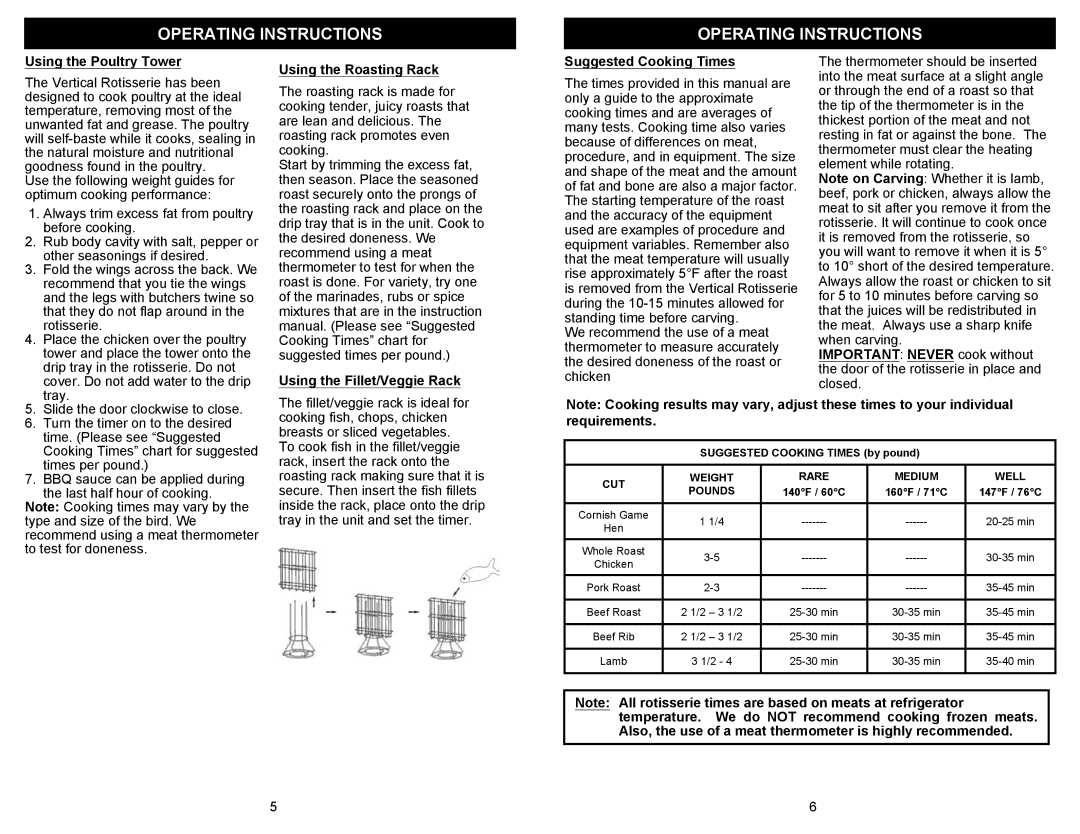
OPERATING INSTRUCTIONS
OPERATING INSTRUCTIONS
Using the Poultry Tower
The Vertical Rotisserie has been designed to cook poultry at the ideal temperature, removing most of the unwanted fat and grease. The poultry will
Use the following weight guides for optimum cooking performance:
1. | Always trim excess fat from poultry |
2. | before cooking. |
Rub body cavity with salt, pepper or | |
3. | other seasonings if desired. |
Fold the wings across the back. We | |
| recommend that you tie the wings |
| and the legs with butchers twine so |
| that they do not flap around in the |
4. | rotisserie. |
Place the chicken over the poultry | |
| tower and place the tower onto the |
| drip tray in the rotisserie. Do not |
| cover. Do not add water to the drip |
| tray. |
Using the Roasting Rack
The roasting rack is made for cooking tender, juicy roasts that are lean and delicious. The roasting rack promotes even cooking.
Start by trimming the excess fat, then season. Place the seasoned roast securely onto the prongs of the roasting rack and place on the drip tray that is in the unit. Cook to the desired doneness. We recommend using a meat thermometer to test for when the roast is done. For variety, try one of the marinades, rubs or spice mixtures that are in the instruction manual. (Please see “Suggested Cooking Times” chart for suggested times per pound.)
Using the Fillet/Veggie Rack
Suggested Cooking Times
The times provided in this manual are only a guide to the approximate cooking times and are averages of many tests. Cooking time also varies because of differences on meat, procedure, and in equipment. The size and shape of the meat and the amount of fat and bone are also a major factor. The starting temperature of the roast and the accuracy of the equipment used are examples of procedure and equipment variables. Remember also that the meat temperature will usually rise approximately 5°F after the roast is removed from the Vertical Rotisserie during the
We recommend the use of a meat thermometer to measure accurately the desired doneness of the roast or chicken
The thermometer should be inserted into the meat surface at a slight angle or through the end of a roast so that the tip of the thermometer is in the thickest portion of the meat and not resting in fat or against the bone. The thermometer must clear the heating element while rotating.
Note on Carving: Whether it is lamb, beef, pork or chicken, always allow the meat to sit after you remove it from the rotisserie. It will continue to cook once it is removed from the rotisserie, so you will want to remove it when it is 5° to 10° short of the desired temperature. Always allow the roast or chicken to sit for 5 to 10 minutes before carving so that the juices will be redistributed in the meat. Always use a sharp knife when carving.
IMPORTANT: NEVER cook without the door of the rotisserie in place and closed.
5. | Slide the door clockwise to close. |
6. | Turn the timer on to the desired |
| time. (Please see “Suggested |
| Cooking Times” chart for suggested |
7. | times per pound.) |
BBQ sauce can be applied during | |
| the last half hour of cooking. |
Note: Cooking times may vary by the type and size of the bird. We recommend using a meat thermometer to test for doneness.
The fillet/veggie rack is ideal for cooking fish, chops, chicken breasts or sliced vegetables. To cook fish in the fillet/veggie rack, insert the rack onto the roasting rack making sure that it is secure. Then insert the fish fillets inside the rack, place onto the drip tray in the unit and set the timer.
Note: Cooking results may vary, adjust these times to your individual requirements.
SUGGESTED COOKING TIMES (by pound)
CUT | WEIGHT | RARE | MEDIUM | WELL | |
POUNDS | 140°F / 60°C | 160°F / 71°C | 147°F / 76°C | ||
| |||||
|
|
|
|
| |
Cornish Game | 1 1/4 | ||||
Hen | |||||
|
|
|
| ||
|
|
|
|
| |
Whole Roast | |||||
Chicken | |||||
|
|
|
| ||
|
|
|
|
| |
Pork Roast | |||||
|
|
|
|
| |
Beef Roast | 2 1/2 – 3 1/2 | ||||
|
|
|
|
| |
Beef Rib | 2 1/2 – 3 1/2 | ||||
|
|
|
|
| |
Lamb | 3 1/2 - 4 | ||||
|
|
|
|
|
Note: All rotisserie times are based on meats at refrigerator temperature. We do NOT recommend cooking frozen meats. Also, the use of a meat thermometer is highly recommended.
5
6
